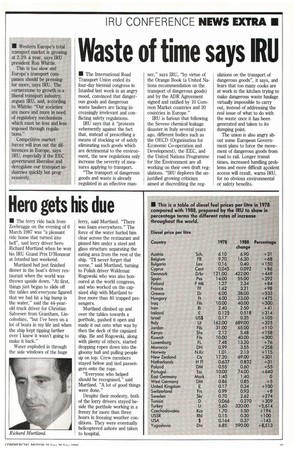Waste of time says IRU
Page 23

If you've noticed an error in this article please click here to report it so we can fix it.
• The International Road Transport Union ended its four-day biennial congress in Istanbul last week in an angry mood, convinced that dangerous goods and dangerous waste hauliers are facing increasingly irrelevant and conflicting safety regulations.
IRU says that it "protests vehemently against the fact that, instead of prescribing a means of stocking or of safely eliminating such goods which are detrimental to the environment, the new regulations only increase the severity of measures applying to transport.
"The transport of dangerous goods and waste is already regulated in an effective man ner," says IRU, "by virtue of the Orange Book (a United Nations recommendation on the transport of dangerous goods) and by the ADR Agreement signed and ratified by 10 Common Market countries and 20 countries in Europe."
IRU is furious that following the Seveso chemical leakage disaster in Italy several years ago, different bodies such as the OECD (Organisation for Economic Co-operation and Development), the EEC, and the United Nations Programme for the Environment are all working on their own draft regulations. "IRU deplores the unjustified growing criticism aimed at discrediting the reg ulations on the transport of dangerous goods", it says, and fears that too many cooks are at work in the kitchen trying to make dangerous waste haulage virtually impossible to carry out, instead of addressing the real issue of what to do with the waste once it has been generated and taken to its dumping point.
The union is also angry about some European Government plans to force the movement of dangerous goods from road to rail. Longer transit times, increased handling problems and more difficult accident access will result, warns IRU, for no obvious environmental or safety benefits.
















































































































































